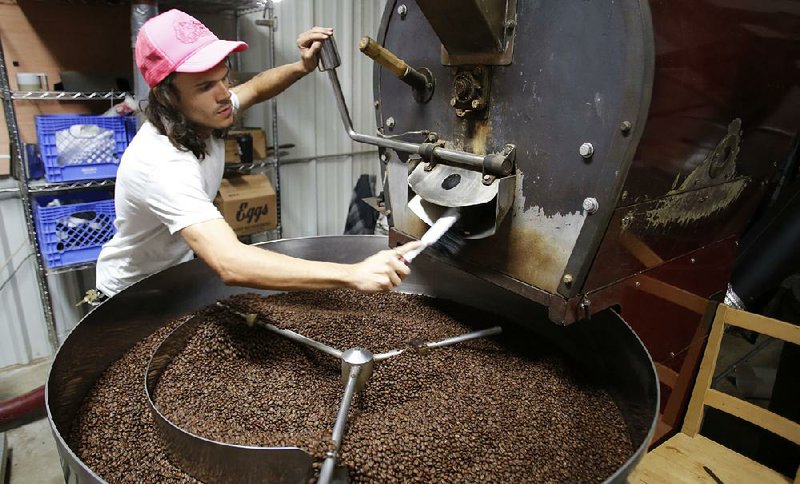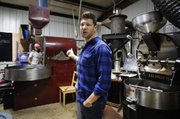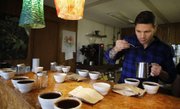SPRINGDALE -- The air is filled with warm, comforting smells as shiny spoons clink against the sides of white cups filled with dark, steaming java. Then there comes the slurping, really loud, intense slurping needed to properly taste the coffee, followed by comments about the beverage's quality and attributes.
"It's so buttery," Jon Allen, co-owner of Onyx Coffee Lab, said to Mark Michaelson, the company's head roaster. "It smells like straight butter."
The tasting ritual, called cupping, is a quality control measure at Onyx Coffee Lab's roastery in a small warehouse district off U.S. 412. The space is used to prepare, store and package the company's gourmet coffees that are shipped and sold all around the U.S. and offered in its three coffee houses in Northwest Arkansas. The roastery also is used as a classroom of sorts to train the company's baristas.
Onyx will be moving the operation to new quarters in the historic Dollar Saver building in downtown Rogers. The 20,000-square-foot site is being remodeled and will house an Onyx Coffee Lab coffee house, an expanded roastery operation, and a school that will teach a variety of classes focused on the coffee industry.
"We just need more space," Allen said, though there's not a firm timetable on when the move will take place.
Allen and his wife, Andrea, started their coffee business in Northwest Arkansas in 2008, eventually establishing Onyx Coffee Lab in 2012. Today, Onyx Coffee Lab operates coffee houses in Fayetteville, Springdale and Bentonville and employs about 80 workers across all its operations, including its roastery.
To get the beans for the roastery, Jon Allen travels to East Africa and Central America several times a year, visiting farmers on buying excursions. Michaelson, the head roaster, noted that when Allen goes on his trips, the terminology and protocol of cupping helps break down barriers and ensures both buyer and seller are on the same page.
"They're speaking the same language, even though they might not both speak English," he explained.
Onyx imports those coffee beans, roasts and packages them, and sells them through various channels to retailers, coffee houses and individuals across the U.S. Allen estimates that about 80 percent of the company's coffee is sold outside of Arkansas.
Coffee is big business with projected revenue of $11.9 billion for 2016, according to market research firm IBISWorld. Industry growth declined slightly between 2011 and 2016 but is expected to grow 2.7 percent annually over the next five years, to $13.5 billion, mostly on the strength of premium coffee sales. The research company notes that going forward, consumer preferences toward "ethical consumerism and the growing awareness of fair trade and organic coffee production methods will be vital to industry performance."
In an effort to be as transparent as possible with its customers, the coffee produced by Onyx Coffee Lab is labeled with detailed data, including the country, farm and elevation at which the beans were grown and when the beans were imported. Allen said Onyx Coffee Lab was one of the first coffee companies to offer so much detail on its labeling. Now others in the industry are following suit.
"We did it as a sort of rebellion," Allen explained. "We got tired of the secrets."
According to statistics and marketing information company Statista, coffee drinkers spent $21.32 a week on coffee in 2013, up from $21 the year earlier. In a survey of U.S. consumers, 94 percent said a coffee's taste was the primary reason for the purchase with price a close second at 89 percent.
In March, the National Coffee Association, a trade group, noted in its 2016 National Coffee Drinking Trends report that consumption of espresso-based drinks was three times as high as it was in 2008, pushed mostly by younger coffee drinkers. According to the survey, in the 18-to-24-year-old age group, past-day consumption of gourmet coffee beverages went from 13 percent to 36 percent for the period, and for those 25 to 39 years old, it jumped from 19 percent to 41 percent.
Allen pointed out that less than 2 percent of all coffee beans grown qualifies to be called specialty coffee, of those, less than 1 percent make the cut for Onyx.
Getting access to those quality beans was hard at first, but Allen was persistent. It also helped that Onyx won a Good Food Award for its coffee in 2016 and is a finalist in the same category for 2017. The more than 200 finalists represent 14 food and drink categories from 38 states. The awards, from the nonprofit Good Food Foundation, focus on food that is tasty, authentic and responsibly produced.
"It was really important to us," Allen said about the award's gravitas inside the coffee industry. "It really helped us get our foot in the door."
He noted that to get quality coffee to consumers, buyers must be willing to pay a fair price for coffee beans from the farmers. Without the incentive of good pricing, farmers are less motivated to grow and pick quality beans. Allen said low prices for coffee beans means, in the end, bad coffee in consumers' cups.
"We pay what coffee is worth," Allen said. "You're only as good as the coffee you can buy."
SundayMonday Business on 12/18/2016



